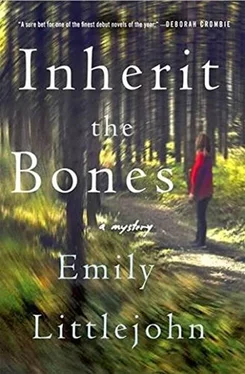It was a feeling I was used to, one that I knew would eventually pass. Starting an investigation is like dumping a five hundred-piece puzzle out from a cardboard box. All those pieces, random little bits of colors and shapes, and you stare and stare and then you find one that maybe goes with this one, and now you’ve got two. And then you find a third, and so on. Bit by bit, a picture starts emerging.
I parked and checked in at the Cottage Inn’s front office, a tiny room with a desk, a computer and fax machine, and a phone. A teenage girl with bad acne and a noisy wad of Juicy Fruit eyeballed my badge without a word. She waved her hand in the general direction of the river and I took that as consent to enter the property.
A squat wooden post with an inlaid map said that 2B was one of a dozen cabins on the other side, the east side, of the Arkansas. I crossed a narrow footbridge, pausing for a moment to look down into the river, and caught a glimpse of a trout, a real beauty, as she made her way under the bridge. Her ruby red scales flashed at me like a showgirl’s feathers and then she was gone, hiding in the rocks at the river’s bank.
Rolling up my shirtsleeves and wishing I’d worn shorts, I consulted another wooden post and then continued on to the small cabin and rapped twice on the door and waited.
Inside, I heard shuffling and a low cough and then the door opened and the heavy-sweet smell of pot hit me full force. The face of a plump young woman emerged from behind the smoke. Her eyes were rimmed with a redness that matched her flame-colored hair. She coughed again and then her eyes widened when she saw the badge I held up.
I decided Joseph Fatone was either a liar or an idiot regarding the matter of drugs in the circus. This was clearly not the girl’s first time down Mary Jane Lane.
“Uh,” she grunted.
“Tessa O’Leary?” I asked. I stepped back to avoid inhaling the smoke and I spoke a little louder than I’d intended.
The girl’s eyes grew even wider. With her right hand, she yanked at a loose cuticle on her left hand and then quickly brought the bleeding finger to her lips. She sucked at the blood and her mouth made a wet squelchy sound not unlike that of a boot being pulled from mud.
“Uh,” she said again.
Red was seriously stoned.
I gave her a gentle smile. “Don’t worry, I’m not here because of the pot. I’m here about Reed Tolliver. Is Tessa here?”
Another young woman emerged from behind the chubby one and gently shouldered her out of the way, until their positions were reversed and Red was in the back and the new girl was in front.
“I’m Tessa,” she said. She was petite and compact, with the muscular body of a gymnast. Her hair was cut short, in that pixie style that can look masculine unless the wearer has feminine or delicate features.
Tessa had both; she looked like a fairy.
Thankfully, she didn’t seem stoned. Not even high.
“Um, let’s talk out here,” Tessa said. She was remarkably composed for someone who’d just been caught with a hell of a lot of weed in her house, if the volume of smoke was any indication of the girls’ stash.
I stood back as she whispered something to Red and then she joined me on the front porch. As the door closed behind Tessa, I saw Red’s face for a moment in the narrow space between the door and the jamb and she no longer looked stoned.
The young woman looked furious.
“Sorry about that. Lisey is really upset about the whole Reed thing. God knows, I am, too, but she’s having nightmares and anxiety attacks and stuff. I thought the weed might help,” Tessa said. “I have a medical license for it, so it’s okay, right? This is Colorado, after all.”
“You know what? Let’s just pretend I didn’t see it, okay? And don’t distribute anymore. I’m Officer Monroe.”
She nodded, very solemn. “It’s for my back. I hurt it on the bars last year and weed is the only thing that seems to relax my muscle spasms and lets me go on with my routine.”
“What are the bars?” I asked.
We had, by some unspoken agreement, begun to stroll the Cottage Inn grounds, and we made our way along the river. I was envious of Tessa’s T-shirt and shorts; my long black slacks were starting to stick to my legs from the sweat pouring down them.
“The trapeze bars. I’m a trapeze artist; I’ve been doing it for almost fifteen years and my back is just shot,” she said.
My jaw dropped. “Fifteen years? How old are you?”
She laughed. “I’m twenty-two. My parents got me started on the bars when I was seven. They had me in gymnastics when I was four.”
“Wow. That’s incredible. Tessa, I think you know I’m here about Reed. I’m so very sorry for your loss, and I’m hoping we can chat for a few minutes,” I said. The young woman was composed now but I knew that could change at any moment. Grief is a funny thing; it catches you when you least expect it.
We came across a muddy patch and skirted the edge. I started to slip and Tessa caught my elbow and held me up while I regained my balance. I’d noticed in the last few weeks that the Peanut had really messed with my center of gravity; I hadn’t been this prone to slipping and falling since I’d been a baby myself, learning to walk.
“How long have you been with the circus?”
“I was legally emancipated when I was sixteen and I joined up with Fellini’s about a year later,” she said. She leaped over another mud puddle and I walked around it, careful not to slip again.
“Rough home life?”
Tessa shrugged. “What’s rough? Compared to some, I guess; others, not so much. I’m still in touch with them, so I guess that says something. We were very poor; they still live in a trailer park in a tiny town in Idaho.
“How about you?” she continued. “That’s a gnarly scar you’ve got, what happened, bar fight?”
My hand went to my neck, as it does when my scar is mentioned. It begins at the base of my skull and travels around the right side of my neck, down over my collarbone, and onto my chest, in a rough half-circle of knotted, twisted flesh.
“No, it’s not from a bar fight. It was a car accident, when I was four,” I said. “It was Christmas Day and we were headed home from my grandmother’s house, in Denver. We hit black ice on the highway and skidded into the path of an oncoming semi.”
“God, how horrible,” Tessa said. She shivered. “I’ve never been in an accident. Do you remember it?”
I nodded. “Bits and pieces. I remember my mother screamed, and my dad, he was driving, he yelled at me to hold on. After the impact, though, it’s all sort of hazy.”
A lie, one I had told so often it rolled off my tongue as sweet as syrup.
In truth, I remember coming to, upside down, hanging in the car. Blood ran from my neck and face in a steady flow, and I had to wipe it from my eyes to see. The car was silent; my mother and father looked asleep.
But I knew they weren’t asleep.
I knew if they were alive, they’d have been frantically calling to me, helping me, urging me to pull myself out of the car.
Tessa noticed my silence.
She said, “Yeah, I don’t like to talk much about my family, either. It’s hard, you know, unless you’ve gone through it. And I’ve gone through some deep shit.”
She grew quiet, so I followed her lead. At the academy, we’d had some training in adolescent counseling, and on the job of course, I’d been exposed to a fair share of family crisis situations. But I still felt like I was walking on eggshells when it came to these things. Some kids like to be asked questions and talking seems to help. For others, prying is akin to picking at scabs; painful and apt to reopen old wounds that are desperately trying to heal.
Читать дальше

![Лаура Бренз - Потомственная ведьма[Inherit the Witch]](/books/79609/laura-brenz-potomstvennaya-vedma-inherit-the-witch-thumb.webp)










